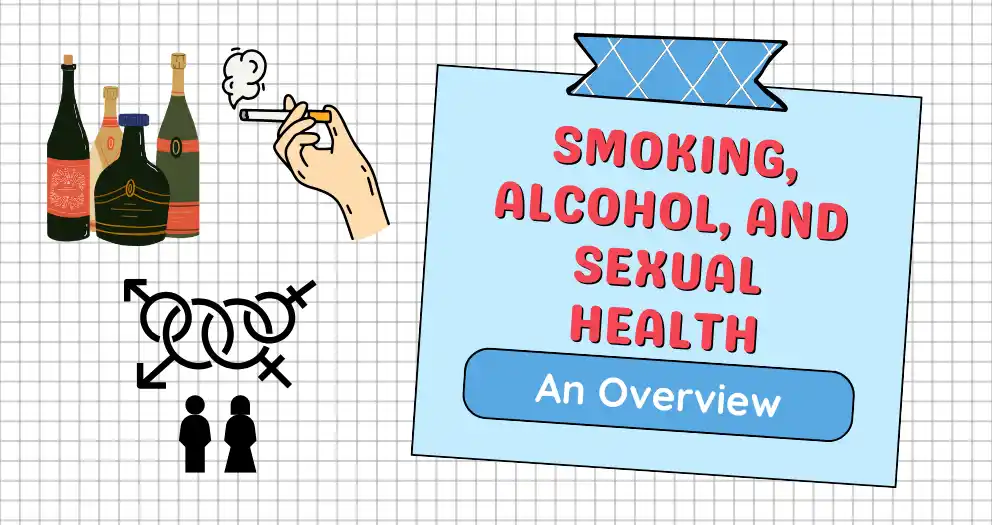Sexual health is an essential part of overall well-being, yet it is often overlooked when discussing the effects of lifestyle choices like smoking, alcohol consumption, and drug use. These substances can have a significant impact on sexual performance, fertility, and overall reproductive health. Understanding how they affect the body and taking steps to reduce or eliminate their use can lead to improved sexual health and a better quality of life.
In this blog, we’ll explore the effects of smoking, alcohol, and drugs on sexual health, answer common questions, and provide actionable tips for quitting these habits and improving your overall health. This guide is written in simple, user-friendly language to help local audiences understand the importance of making healthier choices.
How Smoking Affects Sexual Health
Smoking is one of the most harmful habits for your overall health, and its negative effects extend to sexual health as well. Cigarettes contain thousands of chemicals, including nicotine, which can damage blood vessels, reduce blood flow, and impair sexual performance.
Effects of Smoking on Sexual Performance
- Erectile Dysfunction (ED): Smoking is a leading cause of ED in men. It damages the blood vessels and restricts blood flow to the penis, making it difficult to achieve or maintain an erection.
- Reduced Stamina: Smoking decreases lung capacity and overall energy levels, which can lead to reduced stamina during sexual activity.
- Decreased Libido: The toxins in cigarettes can lower testosterone levels, leading to a reduced sex drive.
Effects of Smoking on Fertility
- Lower Sperm Quality: Smoking reduces sperm count, motility (movement), and morphology (shape), all of which are critical for fertility.
- DNA Damage: The chemicals in cigarettes can damage the DNA in sperm, increasing the risk of infertility and birth defects.
- Hormonal Imbalances: Smoking disrupts the production of hormones necessary for reproductive health.
Tips for Quitting Smoking
- Set a Quit Date: Choose a specific date to quit and stick to it.
- Seek Support: Join a support group or talk to friends and family about your decision to quit.
- Use Nicotine Replacement Therapy (NRT): Products like nicotine gum, patches, or lozenges can help reduce withdrawal symptoms.
- Consult a Doctor: Medications like varenicline (Chantix) or bupropion (Zyban) can help you quit smoking.
- Adopt Healthy Habits: Replace smoking with healthier activities like exercise, meditation, or chewing sugar-free gum.
How Alcohol Affects Sexual Health
Alcohol is often associated with relaxation and socializing, but excessive consumption can have serious consequences for sexual health. While moderate drinking may not cause significant harm, heavy or chronic alcohol use can lead to a range of sexual and reproductive issues.
Effects of Alcohol on Sexual Performance
- Erectile Dysfunction: Alcohol is a depressant that slows down the central nervous system, making it harder to achieve and maintain an erection.
- Delayed Ejaculation: Excessive alcohol consumption can interfere with the signals between the brain and the body, leading to difficulty ejaculating.
- Reduced Sensitivity: Alcohol can dull physical sensations, reducing sexual pleasure for both partners.
Effects of Alcohol on Fertility
- Lower Testosterone Levels: Chronic alcohol use can reduce testosterone production, leading to decreased libido and fertility.
- Poor Sperm Quality: Alcohol affects sperm count, motility, and morphology, similar to smoking.
- Hormonal Imbalances: Alcohol disrupts the balance of hormones like luteinizing hormone (LH) and follicle-stimulating hormone (FSH), which are essential for sperm production.
Tips for Reducing Alcohol Consumption
- Set Limits: Stick to moderate drinking guidelines (no more than 2 drinks per day for men and 1 drink per day for women).
- Track Your Intake: Use a journal or app to monitor how much you drink.
- Find Alternatives: Replace alcoholic beverages with non-alcoholic options like sparkling water or mocktails.
- Avoid Triggers: Identify situations or emotions that lead to drinking and find healthier ways to cope.
- Seek Professional Help: If you struggle with alcohol dependency, consider therapy or joining a program like Alcoholics Anonymous (AA).
How Drugs Affect Sexual Health
Recreational drug use, including substances like marijuana, cocaine, opioids, and amphetamines, can have severe consequences for sexual health. These drugs affect the brain, nervous system, and hormonal balance, leading to both short-term and long-term issues.
Effects of Drugs on Sexual Performance
- Erectile Dysfunction: Many drugs, especially opioids and stimulants, interfere with blood flow and nerve function, leading to ED.
- Reduced Libido: Drugs can alter brain chemistry, reducing sexual desire and arousal.
- Impaired Judgment: Drug use can lead to risky sexual behavior, increasing the risk of sexually transmitted infections (STIs) and unplanned pregnancies.
Effects of Drugs on Fertility
- Sperm Damage: Drugs like cocaine and marijuana can reduce sperm count and quality.
- Hormonal Disruption: Many drugs interfere with the production of testosterone and other hormones necessary for fertility.
- Addiction and Dependency: Long-term drug use can lead to chronic health issues that further impair sexual and reproductive health.
Tips for Quitting Drugs
- Seek Professional Help: Consult a doctor or addiction specialist for guidance on quitting.
- Join a Support Group: Programs like Narcotics Anonymous (NA) provide support and accountability.
- Consider Therapy: Cognitive-behavioral therapy (CBT) can help address the underlying causes of drug use.
- Adopt a Healthy Lifestyle: Exercise, eat a balanced diet, and focus on building a routine that supports recovery.
- Avoid Triggers: Stay away from environments or people that encourage drug use.
Frequently Asked Questions (FAQs)
1. Can Smoking, Alcohol, or Drugs Cause Permanent Sexual Dysfunction?
In many cases, the damage caused by these substances can be reversed if you quit early and adopt a healthy lifestyle. However, long-term use may lead to permanent issues, so it’s important to seek help as soon as possible.
2. How Long Does It Take to See Improvements After Quitting?
Improvements in sexual health can occur within weeks of quitting smoking, alcohol, or drugs. For example, blood flow and testosterone levels may start to normalize within a few weeks, leading to better sexual performance.
3. Are There Natural Remedies to Counteract the Effects of These Substances?
Yes, adopting a healthy diet, exercising regularly, and managing stress can help improve sexual health. Foods rich in antioxidants, zinc, and omega-3 fatty acids can support recovery.
4. Can Occasional Use of These Substances Still Affect Sexual Health?
Even occasional use can have short-term effects on sexual performance, such as reduced sensitivity or stamina. Chronic use, however, poses a much greater risk to long-term sexual and reproductive health.
5. Should I See a Doctor for Sexual Health Issues Related to These Substances?
Yes, consulting a healthcare professional is highly recommended. They can help identify the underlying causes of your symptoms and recommend appropriate treatments or lifestyle changes.
Final Thoughts
Smoking, alcohol, and drug use can have a profound impact on sexual health, affecting everything from performance to fertility. The good news is that by quitting these habits and adopting a healthier lifestyle, you can significantly improve your sexual and overall health. If you’re struggling with any of these issues, don’t hesitate to seek help from a healthcare professional or support group.
Remember, taking the first step toward quitting is the most important part of the journey. Your body and mind will thank you for making healthier choices, and you’ll enjoy a better quality of life, both in and out of the bedroom.
If you found this guide helpful, share it with others who may benefit. For more tips and resources on sexual health and wellness, explore our website!




Write a comment
Your email address will not be published. All fields are required